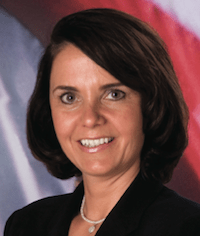Elizabeth Seidel
Managing Director and Global Securities Lending Co-Product Head • Brown Brothers Harriman When Elizabeth (Missy) Seidel began her career in a fund accounting role, she never envisioned it would lead her down a path to securities lending. Fast-forward 20 years and Seidel co-heads the Securities Lending business for Brown Brothers Harriman (BBH).
When Elizabeth (Missy) Seidel began her career in a fund accounting role, she never envisioned it would lead her down a path to securities lending. Fast-forward 20 years and Seidel co-heads the Securities Lending business for Brown Brothers Harriman (BBH).
Seidel has spent her entire career in financial services, transitioning from fund accounting into securities lending at State Street and to client-facing roles at Wellington Management Company and Boston Global Advisors, ultimately joining BBH in 1999. She recalls of her time at State Street: “It was exciting to begin my career at a large financial institution where I could learn and gain exposure to different products. It was actually fairly soon into my time there that I decided to take a look at securities lending.” Like others in this industry, she never looked back, going on to work on the borrowing side for a Boston-based hedge fund before joining securities lending agent Boston Global Advisors in the mid-1990s. Seidel’s time spent on both the demand and supply sides of the business provided her with invaluable knowledge and expertise.
“I was fortunate to learn a great deal about the product from multiple angles,” says Seidel. “This meant I was able to develop a well-rounded perspective through varied experiences at different organizations and in a range of roles that support a securities lending business. It was exciting to gain that much diversity within one business so early into my career. I knew pretty quickly that I could do this long-term, so when the opportunity arose to join Brown Brothers Harriman and develop the securities lending product there, I seized it immediately. It gave me an opportunity to draw on my experience while working with a really talented group of people at a firm with a unique culture.”
Seidel moved to BBH and continued to work with Chris Donovan, who in 1993 had pioneered “intrinsic value” lending at Boston Global Advisors. This concept was virtually unknown at the time. “It was exciting to be part of a team focused on developing an intrinsic value lending program and to bring something new and innovative to the market.” Seidel recalls that BBH’s decision to establish an intrinsic value lending program was very complimentary to the overall philosophy of the firm. “As a partnership, we were, and still are, able to take a long-term view when servicing the needs of our clients.”
Since the credit crisis, the intrinsic value lending philosophy has gained broad popularity amongst providers historically more focused on volume lending. Seidel believes this trend is likely to continue as the demand for intrinsic value programs is largely being driven by regulation. “The profitability of general collateral [volume] lending stands to be most negatively impacted by the implementation of new regulation,” she says.
“Regulation itself is increasing the need for greater transparency and customization amongst beneficial owners, whether related to risk management or revenue opportunities, and in many ways this is extremely positive for our industry,” says Seidel. “If the financial crisis highlighted anything, it was that there was a difference in the way securities lending agents and beneficial owners were approaching securities lending activities.”
While regulation has been a distraction for those that needed to make changes to address new requirements, as Seidel notes, BBH’s core philosophy and successful track record throughout the credit crisis has enabled the firm to remain focused. “We’ve managed to avoid many of the distractions faced by others. We remain committed to the business and committed to investing in technology and solutions that meet our clients’ needs for greater transparency and optimization of lending revenue. And our position coming out of the financial crisis has allowed us to make these investments on a proactive basis.”
Commenting on the future of the securities lending industry, Seidel says that the cyclical nature of the demand and regulatory environment must be considered when evaluating the long-term outlook and that securities lending should be viewed as a long-term investment overlay. “There’s no doubt that demand has been dampened by lack of hedge fund conviction and reduced M&A activity. But as monetary policy becomes clearer, we should begin to see confidence and volatility return to the levels required to drive borrowing demand.” Seidel also notes that the growing investment in hedge funds and alternatives should contribute to borrowing demand over the longer term.
Despite the current cyclical low in securities lending demand, Seidel is excited to see how the industry will evolve. “We have a very positive outlook on securities lending, and we are especially confident about BBH’s position in the industry. We believe great opportunities exist for providers that are committed to investing in this business and that are nimble enough to adapt to the changing environment. Regulation will continue to drive the trend for intrinsic value lending, and as a specialist in this strategy, we believe we’re extremely well positioned to help clients execute upon it and drive profitable revenue for their shareholders in the process.”
–Janet Du Chenne